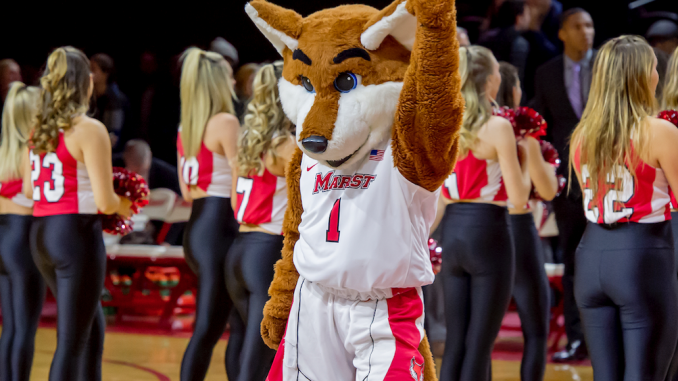
Since 1979 Marist students have cheered alongside Shooter the Fox at athletic contests, but early last month, “Shooter” quietly became “Frankie.” Marist Athletics cite the increasing frequency of mass shootings and gun violence across the country as the drive for change in the upstate New York school’s longtime mascot for the 23 varsity teams and over 550 Marist student-athletes.
The mascot was originally named to reflect the Red Fox’s basketball prowess and has donned a basketball jersey with the No. 1 and “Shooter” on the back until the second weekend in November when he made his debut with his New Jersey with the name “Frankie.”
“Unfortunately, in our culture today, there is a negative stigma to that term ‘shooter.’ And I just didn’t think it was appropriate for us at this time to perpetuate that term,” Marist Athletic Director Tim Murray told the Poughkeepsie Journal on Tuesday, Nov. 14, the same day the Marist Athletics website was updated to reflect the change.
The Marist Red Foxes compete in NCAA Div. I athletics as a member of the Metro Atlantic Athletic Conference (MAAC) except for the football team which is in the Pioneer Football League (PFL) and have been recognized by Sports Illustrated as one of the top 200 college athletic programs in the country. The red fox, or reynard, is indigenous to the Hudson Valley where Marist is located and is from which the school colors (red and white) are derived.
The United States’ Congressional Research Service acknowledges that there is not a broadly accepted definition, and defines a “public mass shooting” as one in which four or more people selected indiscriminately, not including the perpetrator, are killed, echoing the FBI definition of the term “mass murder.” There have been a total of 182 acts of gun violence in the U.S. that qualify as mass shootings under this definition since 1979. Although a few complaints had historically been received regarding the name of the mascot, it was not until October that the quantity of complaints rose significantly.
“I don’t think it was necessarily one event, but Las Vegas was the most recent one that kind of triggered the change and really made us rethink about what we were doing,” said Assistant Athletic Director Andy Alongi. “The reference point was always ‘the shooter,’ before they would ever identify the person with a name, so it kind of clicked that way to say maybe it’s time to come forward with something more positive.”
On Oct. 1, 64-year-old Stephen Paddock killed 58 people and wounded hundreds by aiming guns out of two Las Vegas hotel windows down on country music festival goers below. There have since been at least two mass shootings across the country: Devin Kelley shot and killed 26 at a church in Sutherland Springs, Texas last month; additionally, a yet-to-be identified shooter took at least four lives when he opened fire at an elementary school and several other locations in Northern California.
Alongi said that although the students at Marist initially voiced their concerns after the change, they have for the most part moved on after their feedback and point of view were heard and understood.
“Our goal with our mascot is to only be positive in every touchpoint they have – with a fan, with a community member, with a student – so, if that were to adversely affect anyone why would we want to do that?” he said. “The mascot is supposed to be fun and lighthearted and not something that would hang over anyone that has been impacted by that kind of event.”
An ’07 alumnus who wishes to remain anonymous does not believe that the name change will affect the mascot’s rhetoric. He said that the mascot only has a significant presence at basketball games and it is more his actions that students are excited by rather than what his name is.
He pointed out though, that “shooter” is a term used frequently in basketball to describe and identify a player who has a strong shot and that could continue to be problematic if that is the association being made.
“I think when you’re going to associate that word, then that might make people a little bit sensitive to it,” he said. “I don’t think that terminology is going anywhere, but I could see how we must be politically correct because the media is driving that coverage and that’s the word they’re using.”
He added that although he does not necessarily care what the name of the mascot is, he hopes that Marist Athletic Administration and the College are making the change for empathetic reasons and will follow up with a more significant initiative against gun violence in schools.
“There are bigger issues than the name of the mascot, we should be trying to figure out why people would do something like that,” he said. “I think if it’s done for the right reasons and they do something about it in some way, then it’s fine by me. I really don’t have a huge opinion on it other than I hope they’re doing it for the right reasons.”
